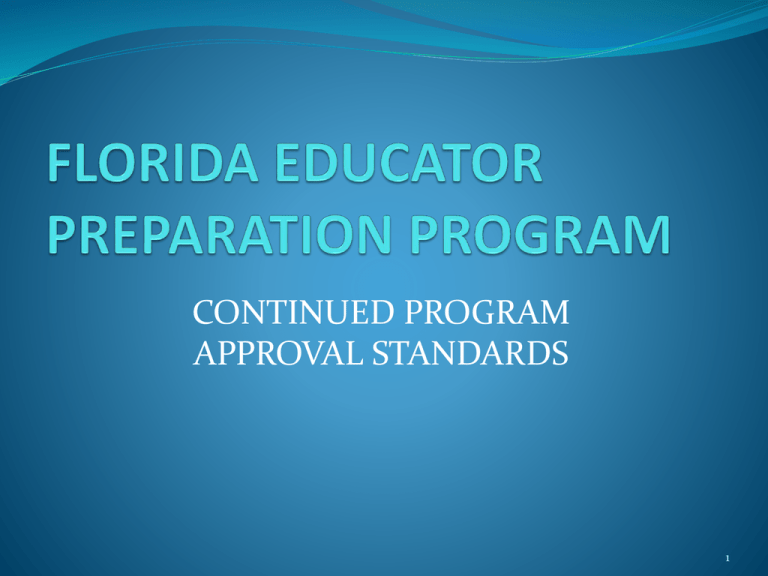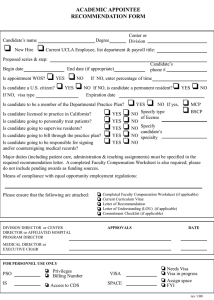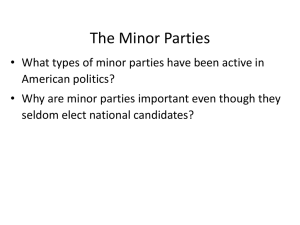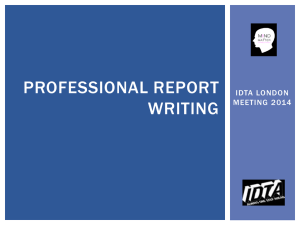Program Approval Presentation
advertisement

CONTINUED PROGRAM APPROVAL STANDARDS 1 Adriana G. McEachern Ph.D. Associate Dean for Academic Affairs and Accreditation 2 AGENDA AND TRAINING OBJECTIVES Participants will be able to… Identify the major components of continued program approval standards Collect, review, and create documents related to the program approval process Create curriculum maps and standards crosswalks Create Critical Tasks with associated scoring rubrics Summarize and report on data collected through document reviews, surveys, and other data sources 3 BENEFITS OF QUALITY EDUCATOR PROGRAMS Well prepared educators will perform better in schools Well prepared educators will stay in the profession longer Well prepared educator graduates will be more satisfied with their program of studies and more likely to recommend the program to others Standards provide program faculty opportunities to make program modifications and improvements Well prepared educators ensure continued high quality of the teaching/counseling/school psychology professions and service to children, families, and others involved in the lives of Pk-12 students 4 MAJOR SHIFTS IN EDUCATOR PREPARATION Emphasis on performance based, competency demonstration Strong relationship between educator preparation and educator performance Strong emphasis on linking student achievement to educator performance Strong emphasis on evaluation of educator preparation program effectiveness 5 FLORIDA’S LAWS AND RULES 2002—Legislature changed Educator Preparation programs to a performance based system. Programs were judged on the performance of candidates and graduates Revisions occurred in 2003, 2004, and 2007 but emphasis still on candidate and graduate performance; beginning emphasis on continuous improvement 2006-Rule 6A-5.066 was changed to focus on candidate as well as program performance 2008-Rule 6A-5.066 standards effective in Fall 2008 6 LAWS Section 1004.04, Florida Statutes established FDOE authority to approve teacher education programs according to state adopted standards Programs are held accountable for producing educators to meet state goals and standards With freedom to innovate 7 LAWS and GUIDELINES Rule 6A-5.056 further defines program approval process Incorporates… ESOL instruction Scientifically researched based reading literacy and computational skills instruction Based on a uniform core curricula established by the State Board of Education 8 PROGRAM APPROVAL STANDARDS Initial Approval—focused on the process—the plan for the elements to be put in place for the program to ensure preparation of qualified educators Continued Approval—focus on curriculum delivery, candidate performance and continuous improvement 9 STANDARDS ADDRESS THE FOLLOWING QUESTIONS 1. How will the required curriculum elements and other state-mandated requirements be delivered and assessed in the program? 2. How will the institution document to ensure that each candidate in the approved program progresses and demonstrates all competencies identified in Statute and Rule/core curriculum? 3. Has the institution planned processes to ensure continuous improvement for each program and across programs? 10 OUTCOMES FOR THE CONTINUED APPROVAL PROCESS Denied—may not stamp completer endorsement on transcripts Conditionally approved—approved for 2 fiscal years and must resubmit to address deficiencies (may stamp endorsement) Fully approved—approved for the time period that all other state approved programs at that institution are given 11 STANDARD 1: CORE CURRICULUM CONTENT Criteria 1.1. Core Curriculum Content Curriculum content is aligned with the Uniform Core Curriculum and other state mandated requirements and a process is established to ensure consistent delivery in coursework and in field/clinical experiences. 12 Elements to be included Florida Educator Accomplished Practices (FEAPs) Professional Education Competencies and Skills for Teacher Certification (PECs) Subject Area Competencies and Skills for Teacher Certification, (PECs Current Edition) ESOL Performance Standards and ESOL Competencies and Skills for Teacher Certification, (Current Edition) Reading Endorsement Competencies Additional Elements of the Uniform Core Curriculum Assessments are documented in syllabi, modules, and coursework. A curriculum map/matrix/or chart for each program reflecting where the appropriate elements are covered throughout the curriculum must be provided 13 STANDARD 1: CORE CURRICULUM CONTENT Criteria 1.2 Field/Clinical experiences Field experiences provide specific guidance from supervising faculty through observation instruments and feedback A narrative is provided that describes how placements and sites are selected A description of tasks associated with each field experience or observation should be included in a table or clearly delineated in syllabi (Field Experience Handbook, Evaluation of Candidate Performance) 14 STANDARD 1: CORE CURRICULUM CONTENT Criteria 1.3 Program Faculty Evidence that faculty have completed either specialized training in clinical supervision, or valid professional teaching certificate, or at least 3 years of successful teaching experience in Pk – 12 grades. A narrative that describes how state requirements for supervising are monitored and met. A table indicating faculty credentials based on state requirements may be included. Faculty teaching ESOL specific courses must have an advanced degree in TESOL or a closely related field, i.e. Foreign Languages with an ESOL endorsement or equivalent training and experience. 15 STANDARD 1: CORE CURRICULUM CONTENT Criteria 1.4 School district personnel Evidence that district personnel have completed specialized training in clinical supervision, and successful demonstration of effective classroom management strategies that consistently result in improved student performance. A narrative should be provided that explains how requirements for school district personnel are documented and monitored A letter or affiliation agreement from the district must be provided that states that all students will be placed with educators who meet state requirements 16 STANDARD 2: Candidate Performance Each candidate in the approved program will demonstrate all competencies identified in Statute and Rule. Indicators, methods and processes have been established to assess and collect data on candidates’ attainment of the Uniform Core Curricular content in coursework, field/clinical experiences, and on the Florida Teacher Certification Examination A flowchart of the process of determining candidate progress and mastery of competencies for program completion, including faculty, data sources and flow of data. 2.1 State mandated admissions requirements 2.2 Assess and collect data on candidate performance (attainment of content) 2.3 Assess candidate impact on Pk-12 student learning 2.4 Assistance provided to program completers 17 STANDARD 2: Candidate Performance 2.1 State mandated admissions requirements Description of admissions process Description of how program collects data on Number of students admitted and enrolled by program Number of candidates meeting admission requirements upon entry to program Number of candidates entering under 10% waiver Documentation of assistance provided to those entering under the 10% waiver. 18 STANDARD 2: Candidate Performance 2.2 Indicators, methods and processes have been established to assess and collect data on candidates’ attainment of the Uniform Core Curricular content in coursework, field/clinical experiences, and on the Florida Teacher Certification Examinations. Data documents a formal process to collect data at the individual and program level at a minimum of two points: one point prior to student teaching and mastery at program completion….demonstrating candidate has mastered the FEAPs, PECs and Subject Area Competencies and Skills at program completion The Professional Education Examination and Subject Area Examination (SAE) of the Florida Teacher Certification Examinations (FTCE) may be used for the second point of mastery at program completion for the Competencies and Skills for Teacher Certification 19 STANDARD 2: Candidate Performance Reading in The Subject Area Course that includes an overview of Reading Competencies 1 &2 ESOL Course that includes the revised ESOL Standards and Competencies Narrative describing the formal process used to collect data at the candidate and program level on passing levels on all 3 tests of the FTCE and process for providing feedback 20 STANDARD 2: Candidate Performance 2.3 Assess candidate impact on Pk-12 student A narrative is provided that describes how learning impact on Pk-12 learning Opportunity for data is collected during candidates to provide field/clinical instruction/interventions experiences. and collect data on A formal process for student learning collecting and analyzing Candidate analysis and results of impact is also reflections described. 21 STANDARD 2: Candidate Performance 2.4 Assistance provided to program completers A narrative is provided that describes a process for additional support or remediation of program completers during first two years of work as an educator Development of an individualized plan of remediation with specific learning outcomes for completers experiencing difficulty 22 STANDARD 3: CONTINUOUS IMPROVEMENT Criteria 3.1 Needs of the state and district served 3.2 Employer Satisfaction 3.3 Program Completer Satisfaction 3.4 Assessing candidate impact on Pk-12 student learning during the first year of teaching 3.5 Decision making for continuous improvement 23 STANDARD 3: CONTINUOUS IMPROVEMENT 3.1 Needs of the state and district served ---A narrative is provided that describes the program philosophy and objectives and how they were determined based on state and local district needs ---Identification of a certification ombudsperson 24 STANDARD 3: CONTINUOUS IMPROVEMENT 3.2 Employer Satisfaction ---A narrative is provided that describes a formal process for collecting and analyzing the following data Employer satisfaction data Percentage of completers employed in Florida public schools the first year following program completion FDOE data on length of stay in classroom [If an institution is using an employer satisfaction survey other than the DOE survey, a copy of the survey must be provided] 25 STANDARD 3: CONTINUOUS IMPROVEMENT 3.3 Program Completer Satisfaction A narrative is provided that describes a formal process for collecting and analyzing completer satisfaction data. [If the institution is using a completer satisfaction survey other than the DOE survey, a copy of the survey must be provided] 3.4 Methods and processes are in place to assess completer impact on Pk-12 student learning based on student achievement data during the first year of employment as a teacher/school counselor/school psychologist 26 STANDARD 3: CONTINUOUS IMPROVEMENT Continuous improvement across and within programs is the result of routine analysis of data collected on Standards 2 and 3; admission, enrollment, and completion status of each candidate; and results of recent faculty experiences Formal evaluation process for annual data analysis Team members involved in the evaluation process Dissemination of results Narrative of stakeholder involvement in continuous improvement process Collection and analysis of results of Faculty Recency Flowchart of process 27 Scoring Scale for Individual Criteria 3 = Acceptable --Most of the evidence presented is clear and appropriate. The explanation of how the criteria are met is adequate and provided in the folio. 2 = Needs Improvement --Some of the evidence presented is unclear and/or inappropriate. The explanation of how the criteria are met is sometimes inadequate or not provided in the folio. 1 = Unacceptable --Most of the evidence presented is unclear and/or inappropriate. The explanation of how the criteria are met is frequently inadequate or not provided in the folio. 28 Description of Overall Scoring (Weighted criteria are 1.1, 2.2, and 3.5.) To earn a Fully Approved Program rating: No score of 1 in any criteria No more than one score of 2 in any weighted criteria No more than three scores of 2 across all three standards To earn a Conditionally Approved Program rating: No score of 1 in any criteria. No more than two scores of 2 in any weighted criteria. No more than four scores of 2 across all three standards To earn a Denied Program rating: A score of 1 in any criteria More than two scores of 2 in any weighted criteria More than four scores of 2 across all three standards 29 THANK YOU FOR YOUR ATTENTION AND GREAT WORK! 30 Dr. McEachern Contact Information If you have questions, concerns please feel free to contact me: mceacher@fiu.edu 305-348-3391 31






